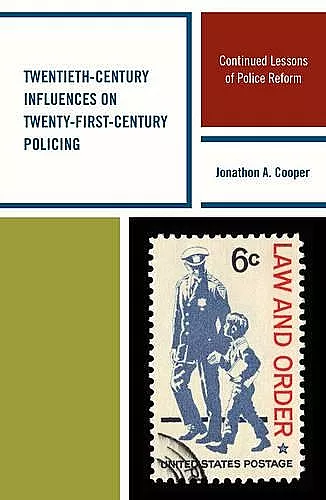Twentieth-Century Influences on Twenty-First-Century Policing
Continued Lessons of Police Reform
Format:Paperback
Publisher:Bloomsbury Publishing PLC
Published:14th Nov '16
Currently unavailable, and unfortunately no date known when it will be back
This paperback is available in another edition too:
- Hardback£99.00(9780739189047)

Events in the United States during the 1950s, '60s, and '70s created tectonic shifts in how the police operated. This was especially true in terms of their relationship with society. These events included, among others: the due process revolution, which guided how police were to do their job; social science research that called into question that efficacy of the professional policing model; and race riots against police activity, which were the result of poor police-minority community relations. This book outlines these (and other) changes, explores their implications for the relationship between society and the police, and suggests that a knowledge of these changes is imperative to understanding trends in contemporary policing as well as the direction policing needs to take. As policing becomes more technologically savvy and scientific in its approach to fighting crime (for example, the SMART Policing Initiative, COMPSTAT, and problem oriented approaches such as Project Safe Neighborhoods) in a time when governments are faced with austerity, it is important to reconsider how policing got to the point it is so that, as police and governments move forward, constitutional guarantees are protected, communication with citizens remains viable and salient, and crime prevention becomes an empirical reality rather than a pipe-dream.
Cooper argues that certain seminal events in the 1950s, 1960s, and 1970s had a profound and lasting effect on the organization and behavior of police forces in the US. The Supreme Court’s rulings on due process challenged police procedures; race riots highlighted long-standing and widespread antagonisms between the police and minorities; and rising crime rates, lawsuits, and social science research revealed police inefficacy and corruption. Cooper provides a lucid synthesis of existing scholarship detailing these important developments. . . .Summing Up: Recommended. Upper-level undergraduates and above. * CHOICE *
Cooper tells the story of American policing, but the book is much more than a historical review of the police. It is a powerful, insightful analysis that demonstrates the interconnectedness of past, present and future in a way that we have seldom seen. The book is a compelling read for police historians, police futurists, and everyone in between. -- Michael White, Arizona State University School of Criminology and Criminal Justice
Dr. Cooper has written a well-researched and authoritative account of modern policing’s linkages to three important decades—the 1950s, 60s, and 70s. His book is a timely and welcome addition to the annals of law enforcement history. -- John L. Worrall, professor of criminology, University of Texas at Dallas
This is a timely manuscript in the wake of recent events precipitated in Ferguson, Missouri and New York City, New York by the deaths of Michael Brown and Eric Garner. It provides a contemporary and thoughtful discussion on the historical relationship between the police and public, how far the police have come, and how far they still have to go. -- Charles Katz, Arizona State University
ISBN: 9781498515931
Dimensions: 232mm x 151mm x 12mm
Weight: 259g
172 pages